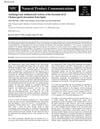 January 2022 in “International Journal of Medical Sciences”
January 2022 in “International Journal of Medical Sciences” Cedrol may be an effective treatment for colorectal cancer.
 2 citations,
October 2022 in “Journal of Biomedical Science”
2 citations,
October 2022 in “Journal of Biomedical Science” Stem cells and their secretions could potentially treat stress-induced hair loss, but more human trials are needed.
 2 citations,
August 2019 in “BMC Complementary and Alternative Medicine”
2 citations,
August 2019 in “BMC Complementary and Alternative Medicine” Asiasari radix extract may be a potential treatment for melanoma because it selectively triggers cell death in melanoma cells by affecting p53 regulation.
 2 citations,
November 2023 in “Frontiers in microbiology”
2 citations,
November 2023 in “Frontiers in microbiology” The health of the gut may be important in developing new ways to prevent, diagnose, and treat alopecia areata.
 July 2021 in “Research Square (Research Square)”
July 2021 in “Research Square (Research Square)” Semecarpus anacardium leaf extract fights breast cancer and extends survival in mice.
 153 citations,
March 2017 in “Endocrine”
153 citations,
March 2017 in “Endocrine” Male pattern baldness involves genetics, hormones, and needs better treatments.
 19 citations,
September 1995 in “Food and nutrition bulletin”
19 citations,
September 1995 in “Food and nutrition bulletin” Leucaena leucocephala is nutritious but needs careful processing to remove toxins.
 9 citations,
October 2012 in “Natural Product Communications”
9 citations,
October 2012 in “Natural Product Communications” The essential oil from Chamaecyparis lawsoniana has strong antibacterial and antifungal effects, especially against yeast and Gram-positive bacteria.
 9 citations,
May 2005 in “Expert Review of Clinical Immunology”
9 citations,
May 2005 in “Expert Review of Clinical Immunology” Blocking interferon-gamma might help treat various autoimmune diseases.
 19 citations,
July 2018 in “Medicines”
19 citations,
July 2018 in “Medicines” Juniperus plants contain compounds with potential for developing various medical treatments.
29 citations,
February 2011 in “PloS one” Astressin-B can reverse and prevent hair loss in stressed mice.
52 citations,
December 2014 in “Journal of Dermatological Science” Apremilast may help treat hair loss in alopecia areata.
51 citations,
December 2017 in “Skin Appendage Disorders” Stress may trigger hair loss by affecting immune protection in hair follicles.
34 citations,
March 2007 in “Biochemical and Biophysical Research Communications” Thioredoxin reductase 1 does not affect glucocorticoid receptor activity in hair follicle cells.
 1533 citations,
October 2008 in “Endocrine reviews”
1533 citations,
October 2008 in “Endocrine reviews” Mice without the vitamin D receptor have bone issues and other health problems, suggesting vitamin D is important for preventing various diseases in humans.
 8 citations,
April 2017 in “Experimental Dermatology”
8 citations,
April 2017 in “Experimental Dermatology” More plasma leptin means higher baldness risk in men.
 1 citations,
June 2023 in “Genes”
1 citations,
June 2023 in “Genes” Hair loss from Alopecia Areata is caused by both genes and environment, with several treatments available but challenges in cost and relapse remain.
 August 2024 in “Stem Cell Research & Therapy”
August 2024 in “Stem Cell Research & Therapy” New regenerative therapies show promise for treating hair loss.
 December 2023 in “International journal of multidisciplinary research and analysis”
December 2023 in “International journal of multidisciplinary research and analysis” SH-MSCs gel can effectively treat alopecia by increasing IL-10 and decreasing TNF-α gene expression.
 426 citations,
August 2014 in “Nature Medicine”
426 citations,
August 2014 in “Nature Medicine” Skin stem cells interacting with their environment is crucial for maintaining and regenerating skin and hair, and understanding this can help develop new treatments for skin and hair disorders.
 124 citations,
July 2012 in “Archives of Dermatological Research”
124 citations,
July 2012 in “Archives of Dermatological Research” Targeting androgen receptors could be a promising way to treat skin disorders with fewer side effects.
 39 citations,
August 2021 in “JAAD International”
39 citations,
August 2021 in “JAAD International” COVID-19 patients often experience hair loss and scalp pain, which may be related to the severity of their infection and treatment drugs.
 32 citations,
January 2022 in “International Journal of Molecular Sciences”
32 citations,
January 2022 in “International Journal of Molecular Sciences” Melatonin, a hormone, can help protect skin from aging by reducing stress, inflammation, and damage, and may also help treat hair loss in women.
 3 citations,
January 2011 in “Annals of Dermatology”
3 citations,
January 2011 in “Annals of Dermatology” Blocking EGFR in skin cells doesn't majorly increase inflammation markers.
1 citations,
January 2020 in “Skin Appendage Disorders” Treatment with methotrexate and prednisolone led to complete hair regrowth and no relapse for 2 years.
 January 2023 in “Journal of Ravishankar University”
January 2023 in “Journal of Ravishankar University” Hair loss can be caused by stress, aging, and harmful substances that create an imbalance in the body's natural processes.
16 citations,
April 2014 in “Anais brasileiros de dermatologia/Anais Brasileiros de Dermatologia” A patient lost all their hair while on rheumatoid arthritis medication.
 3 citations,
January 2022 in “Scientific Reports”
3 citations,
January 2022 in “Scientific Reports” A new treatment called SAMiRNA-AR68 increases hair count in people with hair loss, showing similar results to existing treatments but without side effects.
 2 citations,
January 2022 in “Skin Pharmacology and Physiology”
2 citations,
January 2022 in “Skin Pharmacology and Physiology” Dexamethasone increases the activity of androgen receptors in human skin cells, which may link it to certain types of hair loss.
 September 2023 in “Frontiers in Medicine”
September 2023 in “Frontiers in Medicine” The scalp fat tissue of men with hair loss shows changes in gene activity that may contribute to their condition.
























